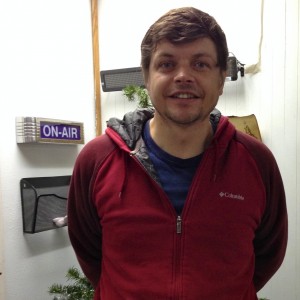
Nelson Mandela’s funeral is Sunday. The well-known African leader passed away at 95. He fought Apartheid or racial segregation, which kept him in prison for decades by the country’s government, run by the white minority. One Bethel resident was deeply moved by his passing.
Wouter Redelinghuys grew up in South Africa and moved to Bethel about a year ago after his wife got a job here. He was born in 1977 and by then Mandela had already been in prison for over a decade.
“It’s very difficult to talk about South Africa and not talk about race, which is always a very sensitive issue,” Redelinghuys says.
He says he saw segregation as a white person.
“Growing up in South Africa, I thought that South Africa was mostly a white country which is a ridiculous thought because only ten percent or even less than ten percent of South Africa’s population is white but segregation was so effective and so strictly enforced that everywhere we went all we saw was white people,” Redelinghuys says. “I remember the signs very clearly, “Europeans Only”. Really the only interaction you had with someone who wasn’t white was someone working in your house or someone working in your garden. Schools, shops, malls, everything was completely segregated. It’s difficult to imagine but you lived in this bubble that was completely outside of reality of what was going on.”
Redelinghuys later learned what was going on. He didn’t hear about Mandela while he was in prison because political prisoners were not allowed to communicate with the outside world. There was also a lot of fear among the people.
“There was a genuine fear of the secret police and the way the government operated,” Redelinghuys says. “Cape Town where I grew up has always been the liberal city in South Africa. It had big student protests and there was a big Anti-Apartheid Movement but even amongst them, it was certainly never openly discussed with us, and I know from speaking to people who were older, you were always extremely careful about who you spoke to if you had Anti-Apartheid views because you never knew if the person you were talking to was a paid government informer or not, which they had a lot of within the Anti-Apartheid Movement as well.”
Mandela was eventually released from prison in 1990 after 27 years. It took continued international pressure and the country’s new government leadership, which saw Apartheid as unsustainable. Redelinghuys says leading up to his release you could see “Free Nelson Mandela” spray painted on walls all over South Africa.
“I was young at the time, I think I was 14, maybe 13, but I remember it as it was yesterday,” Redelinghuys says. “It was a big event, everyone came together and watched it when he was freed from prison as he walked out of the gates out of the prison and that was the first time I can consciously remember seeing him on television. And then the speech he gave afterwards in Union Square in Cape Town.”
Another big event Mandela spurred bringing the country together was the day South Africa won the Rugby World Cup in 1995. Redelinghuys says he’ll never forget it. Rugby was largely considered a white sport but was publicly supported by Mandela.
“It was the first time I can remember being proud to be a South African, it’s a moment that I will always treasure,” Redelinghuys says. “I don’t think there’s a drug in the world that can make you feel as good as we all felt that day.”
The event was documented in the movie, “Invictus”.
Redelinghuys still has family in South Africa he visits about once a year. He says it’s still segregated, not by law anymore but by social status and financial means. He says there’s still tension between racial groups but the country continues to move forward, in part, due to the life of Nelson Mandela.




